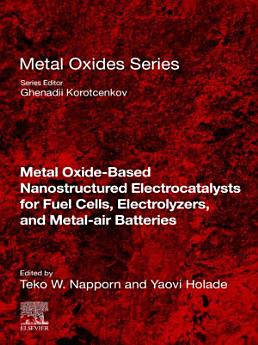Metal Oxide-Based Nanostructured Electrocatalysts for Fuel Cells, Electrolyzers, and Metal-Air Batteries
À propos de cet e-book
À propos de l'auteur
Dr. Teko W. Napporn, is an electrochemist and a tenure Researcher of French National Center of Scientific Research (CNRS) at Institut de Chimie des Milieux et Matériaux de Poitiers IC2MP (University of Poitiers, France) where he is currently co-leader of SAMCat research team. He graduated in 1997 from University of Poitiers with a PhD in Physical, Theoretical and Analytical Chemistry. After he joined as post-doctoral fellow the Electrocatalysis Group of the Chemistry Institute of Sao Carlos at University of Sao Paulo (Brazil), and later in 1999, the Ecole Polytechnique de Montreal (Canada) as research associate. There, he had studied and developed the single chamber SOFC system in collaboration with Hydro-Quebec. Since 2008 he got a tenure position at CNRS for developing novel nanomaterials for electrocatalysis especially for application in energy conversion and storage systems. He participated/managed various projects in the field and co-authored 105 + articles and 11 book chapters. Since 2015, he is involved as Adjunct professor at the Institute of Advanced Science of Yokohama National University (Japan) to design innovative materials for fuel cell and water electrolyzer.
Dr. Yaovi Holade (PhD, MRSC), born in 1987, is a young electrochemist, and holds a permanent Assistant Professor position since September 2016 at ENS Chimie Montpellier (ENSCM, France) where he teaches electrochemical sciences and conducts his researches at European Institute of Membranes of Montpellier (IEM, France). He is currently the Head of the internship office at ENSCM. He graduated from University of Poitiers (Poitiers, France) with a Master in Catalysis and Environment in 2012 (Department of Chemistry) and a PhD (June 2015) in Chemistry within the main field of Electrocatalysis under the supervision of Prof. Boniface K. Kokoh and Dr. Karine Servat. His six months Master II training on palladium-based electrocatalysts resulted into 2 high-impact articles. Then his 3 years PhD research in the multidisciplinary fields of electrocatalysis, nanomaterials, and (bio)fuel cells led to 18 research-articles, 1 review-article, 2 book-chapters, and 2 best PhD Thesis awards from University of Poitiers in 2015 and from the Physical Chemistry Division of French Chemical and Physical Societies (SCF/SFP) in 2016. He co-authored 40+ articles and book-chapters covering the large fields of electrocatalysis, nanomaterials, and bioelectrochemistry. He was post-doctoral researcher in the research group of Prof. Shelley D. Minteer at the University of Utah (UT, USA) from December 2015 to August 2016. He has gained strong experience in the development of synthesis methods for nanostructured materials and their deployment in electrochemical applications as electrode materials (fuel cells, electrolyzers, etc.). His current researches integrate methods of physical and electrochemical sciences with a new point of view and approach to interrogate the intricate relationship between a given material and its electrochemistry toward the ultimate goal of not only enabling the development of practical devices but also and ultimately, unraveling the guiding fundamental principles underlying the performance of a particular electrode material.




